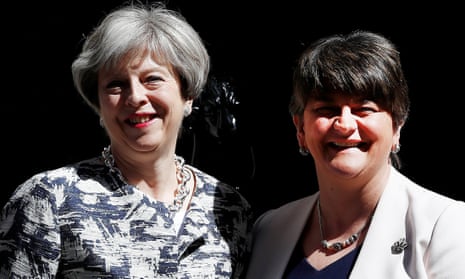The failure to restore the power-sharing administration in Belfast is a direct consequence of the Tory-DUP deal to prop up Theresa May’s government. It is undermining the entire talks process and shattering any remaining pretence of British government impartiality.
Through her pact with the DUP, Theresa May has prioritised her own electoral survival over the interests of the people in the north of Ireland, who have suffered under years of Tory austerity and are now looking into the Brexit abyss. Last Friday Sinn Féin told her that direct rule is not an option. When a Sinn Féin delegation meets with her in Downing Street on Tuesday, we will make it crystal clear again.
The social, economic, and political implications of this rightwing pact on the peace process, and on the people of Ireland, are profound. And now the increasing likelihood of a “no-deal” Brexit, cheered on by British isolationists, is putting the communities and livelihoods of citizens, especially those living along the border corridor, at risk.
Designated special status for the north of Ireland within the EU is the only feasible mechanism by which our island, its people and economy, can be protected by the Tory-DUP Brexit calamity. Quite simply, Sinn Féin will not allow a return to the past. The days of manned checkpoints, customs installations and daily disruptions of rural communities along the Irish border are over.
It should come as no surprise that the talks on restoring the power-sharing arrangements ended without agreement last week. The DUP and the British government are clearly unprepared to grant basic civil and human rights to citizens in the north, guaranteed in previous political agreements, and essential to driving social progress .
For the previous 10 months, Sinn Féin had been seeking agreement on the implementation of outstanding commitments as a basis for restoring public trust and confidence in the political institutions of the Good Friday agreement.
We were flexible, we were willing to stretch ourselves to achieve a breakthrough. Unfortunately, others were not.
The Stormont executive collapsed in January, when Martin McGuinness tendered his resignation over the DUP’s refusal to deal with the financial scandal engulfing that party.
His actions marked the culmination of a growing frustration at the DUP’s approach to power-sharing. Power-sharing agreements on which political institutions here were founded were reneged on, in both letter and spirit. Others were never implemented.
There was no reciprocation of Sinn Féin’s efforts towards reconciliation. One DUP financial scandal followed another. Calculated insults towards the Irish language and culture became part of the accepted vocabulary of DUP representatives and, of course, there was the refusal to recognise rights that are enjoyed by citizens in every other part of these islands.
This denial of rights would not be accepted in London or Dublin and it should not be accepted in Belfast.
Why should LGBTQ people in the north be denied the right to marry? Why should native language speakers be denied the same protections as everywhere else? Why should the families of victims be denied the right to a proper inquest into the death of their loved ones resulting from the conflict in the north?
Those inequalities are indefensible. But this is precisely what the British government and the DUP are attempting to do.
Rather than act with rigorous impartiality, as the Good Friday agreement compelled them to, the British government instead provided cover for the DUP’s refusal to deliver equality and honour their commitments to establish citizens’ rights.
In the absence of the assembly and executive, the choice for both the British and Irish governments is between the protection of the Good Friday agreement or its abandonment.
The issues at the heart of the political crisis in the north of Ireland aren’t going away. It is now the responsibility of the two governments to look to the provisions of the Good Friday agreement and to ensure British-Irish intergovernmental conference meets as soon as possible.
The way forward now is for the two governments to fulfil their responsibility as co-guarantors of the Good Friday and St Andrews agreements, to honour outstanding commitments, and to deliver rights enjoyed by everyone else on these islands to people here.
This would pave the way for the executive in the northern assembly to be restored.
The peace and political processes in Ireland are too important for citizens to be used as pawns in the internal warring in the Tory party. Theresa May should reflect carefully about her next steps – is her personal political survival more important than political and economic stability in the north of Ireland? Time will tell.
